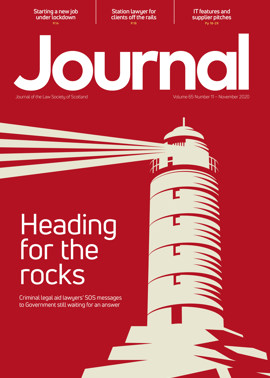Human rights: Inner House message in privacy group chat
In BC v Chief Constable, Police Service of Scotland [2020] CSIH 61 (16 September 2020), the Inner House upheld the Lord Ordinary’s decision that the reclaimers (10 police officers), who were part of closed “WhatsApp” group chats, had no reasonable expectation of privacy in respect of messages sent to the groups.
The reclaimers had petitioned for judicial review, seeking declarator that the use of their WhatsApp messages in misconduct proceedings was unlawful and incompatible with their right to respect for their private and family life in terms of article 8 ECHR. The messages, containing sexist, racist, anti-Semitic and homophobic content, had been discovered during an investigation into sexual offences, in which the reclaimers were of no interest.
The Lord Ordinary, Lord Bannatyne, held inter alia that a right to privacy did exist in the common law of Scotland; however the officers could have “no reasonable expectation of privacy” in relation to the messages given their offensive content and the standards expected of police officers. It was essential for the purposes of public safety and successful policing that the police maintain the confidence of the public.
The officers reclaimed, arguing that the Lord Ordinary had erred in holding that they had no reasonable expectation of privacy, and as to interference with their rights being necessary in the interest of public safety.
Content matters
The Inner House refused the reclaiming motion. It held that the reclaimers could have no reasonable expectation of privacy in respect of the messages in question, thus there was no interference with their rights under article 8(1).
The court did question the Lord Ordinary’s reasoning which led him to conclude that there was a fully developed common law right of privacy in Scotland concomitant in range and scope with article 8 (paras 75-86). However, as there was no cross-appeal questioning this conclusion, the issue was not a live one for the Inner House.
At para 100 the Lord Justice Clerk observed that the Lord Ordinary did not conclude that there could be no private life for a serving police officer: “the restriction was limited to those matters which were capable of suggesting that the officer was not capable of discharging his duties in an impartial manner”. The Lord Ordinary was entitled to take into account the content of the material, in view of what he described as the attributes of the reclaimers as police officers, and the fact that they held a public office by virtue of which they had accepted various restrictions on their private life. These factors were relevant to the question whether the reclaimers might, in the circumstances, be said to have had a reasonable expectation of privacy.
The court also held that, esto there had been an interference with the reclaimers’ article 8(1) rights, disclosure of the messages was necessary in the interest of public safety and prevention of disorder, and would thus be justified according to article 8(2). In particular, at para 114, the Lord Justice Clerk held that “The objective of maintaining [public confidence that police officers will approach their duties fairly and impartially] is sufficiently important to justify the restriction on the reclaimers’ article 8 rights. The information would be disclosed only to the regulatory body and only for a limited purpose… There is a clear rational connection between the aim and the objective. The level of intrusion is limited to the extent necessary for the maintenance of public confidence.”
Lord Menzies held that when deciding whether the reclaimers had a reasonable expectation of privacy, the court should have regard to all the circumstances of the case, which “includes the attributes of the reclaimers (including their status as holders of a public office), the attributes of the recipients, and the content of the messages, and may well include other relevant circumstances” (para 129). The fact that some or all of the recipients were serving police officers and thus under a sworn duty to report, challenge or take action against the conduct of other constables which had fallen below the standards of professional behaviour was a relevant circumstance when determining whether a reasonable expectation of privacy existed.
Commentary
This is a significant decision in the context of human rights law in Scotland. It is clear that police officers, by the very nature of their occupation, in certain circumstances face restrictions in respect of their right to privacy, and that such restrictions are both necessary and proportionate.
While the current case is highly fact sensitive and is concerned with the privacy rights of police officers, its repercussions may be far reaching. At para 147, Lord Malcolm held that “In common with many other professional people and public servants, no police officer can reasonably or legitimately expect article 8 to provide a shield against the consequences of any and all communication to fellow officers, however inimical they might be to the standards he or she is expected to uphold” (emphasis added). This suggests that this judgment may also have consequences for the privacy rights of other regulated professionals and public servants.
There might yet be some more messages to come in the privacy group chat…
Regulars
Perspectives
Features
Briefings
- Civil court: keeping justice on the rails
- Employment: Time for a redundancy refresher
- Family: Watch your step with behaviour-based divorce
- Human rights: Inner House message in privacy group chat
- Pensions: The future – the regulator's blueprint
- Scottish Solicitors' Discipline Tribunal
- Crofting law reform: time to act
- In-house, online and in demand
In practice
- Paralegals: 10 years of recognition
- Ask Ash: Too busy, but still insecure
- Property pitfalls: problematic but preventable
- The Word of Gold: Count us out
- Prepare for the tax due date
- The Eternal Optimist: Help to turn the corner
- Appreciation: Ross Paton
- Appreciation: Claire Reilly (Robertson)
- Tenancies succession reminder







